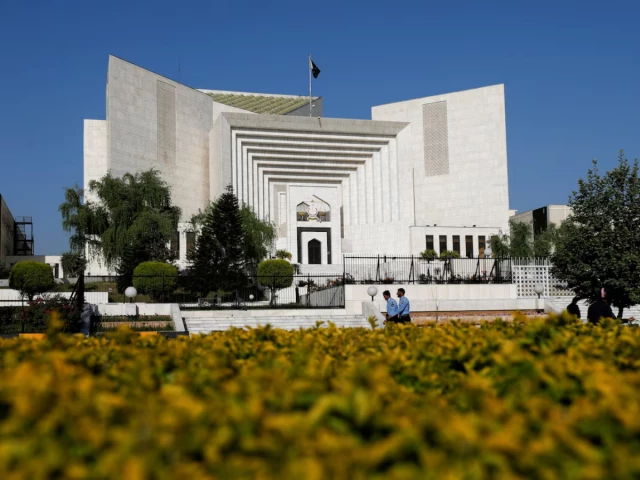Police officers walk past the Supreme Court of Pakistan building in Islamabad, Pakistan April 6, 2022. REUTERS
ISLAMABAD:
The Supreme Court has raised the alarm over systemic impunity for violent crimes against women, noting that the justice system continues to fail those most vulnerable to brutality.
In a seven-page judgment penned by Justice Athar Minallah, the court raised alarms over the growing cases of violence against women, noting that over the past twelve months, the court has only heard appeals arising from sentences involving the death penalty or life imprisonment.
“Alarmingly, a significant number of these cases involve victims who are helpless women – mothers, sisters and wives – brutally killed for motives that are often petty, dubious or grounded in misplaced notions of honor.”
The judgment said these cases “reveal a legal system that appears to serve the privileged and not the weak”.
A three-judge bench, by a 2-1 majority, upheld the death sentence of a man who murdered his 28-year-old wife in a Gujarat family courtroom. Justice Malik Shahzad Ahmad Khan dissented and commuted the death sentence to life imprisonment.
The majority held that the killing was “brutal and shocking”, placing it within the ambit of fasad-fil-arz under Section 299(ee) of the Pakistan Penal Code.
The record shows that the deceased had been admitted to Dar-ul-Aman, Gujrat on 18 December 2013 and had been produced before the family court by police officials. She was sitting inside the courtroom waiting for her case to be called when the appellant entered and fatally shot her several times in front of the President.
The verdict highlighted deep deficiencies in investigation and accountability in cases involving marginalized women. It noted that investigations into crimes against the disadvantaged or underprivileged are often “compromised, poorly conducted or deliberately rendered ineffective”, while cases involving people of privileged social status receive far more attention and institutional action.
“Public attention, institutional response, and media coverage appear to be proportionally affected by the social status of the victims when the crime occurs within a privileged class, the investigation tends to be vigorous, and the issue receives extensive coverage in both electronic and print media.”
“However, violence against women belonging to the underprivileged and marginalized sections of society rarely provokes similar urgent or institutional responses,” the ruling noted.
It added that the bench’s caseload over the past year “reveals a serious absence of deterrence” in crimes against disadvantaged women.
The decision warned that “a state where such impunity prevails – where women can be killed or brutalized with impunity and justice depends on privilege – has failed in its most fundamental duty to protect the life, dignity and equality of half its population”.
It added that selective application of justice reflects “the moral breakdown of governance and society”, transforming the state into a “rule by the few, for the few”.
“A state that protects only the powerful and abandons its most vulnerable has ceased to function as a republic governed under the Constitution.”
The bench expressed expectation that the legislature and the executive “must take effective measures to end such impunity”.



